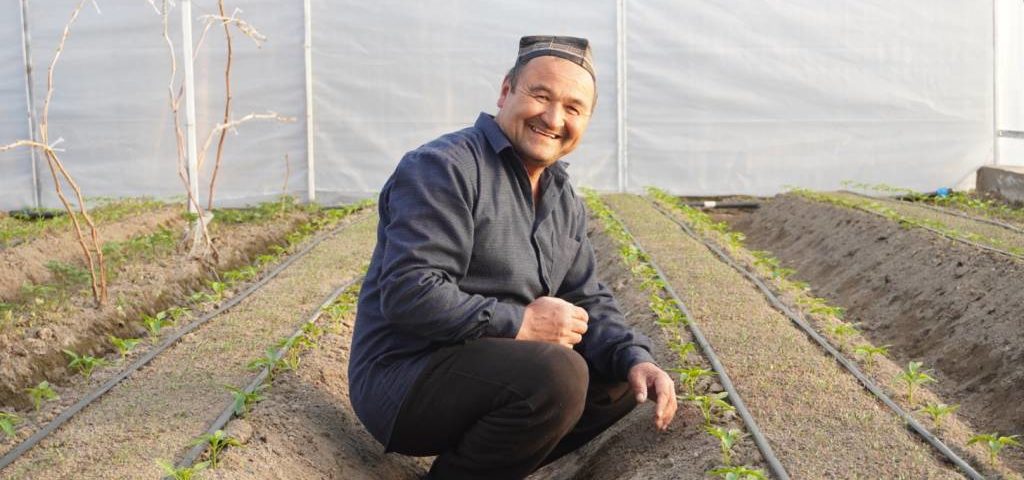AgroExpoUzbekistan / Agrotech Expo

Uzbekistan extended tax incentives for imports and sale of potatoes
21.01.2022
USAID to allocate $2.4 million to support rural women’s activities
31.05.2022The project “Smart Farming for the Future Generation” implemented by the Food and Agriculture Organization of the United Nations (FAO) in cooperation with the Ministry of Agriculture of Uzbekistan is essentially changing the way we think a modern greenhouse should be by adapting technologies to be efficient and affordable for small and medium-scale farmers.
Through modifying greenhouses and optimizing production by five interrelated factors – climate, pest and disease control, cultural practices, water management, and plant nutrition – greenhouse farming is turning into a successful business, benefiting rural people with higher incomes, increased employment opportunities, and diversified diets through affordable and safe food available all year round. All because the project improves the methods of greenhouse management based on a scientific approach and advanced technologies.
“First of all, we recommend using new covering materials for greenhouses – PE plastic films that are 180-200 microns thick with special additives that make the item very durable, absorb ultraviolet radiation, and most importantly, prevent the formation of condensate in the form of drops on the inner surface of the greenhouse. We use shade nets for cooling the greenhouse instead of the traditional spraying of mud on the greenhouse’s surface. To control pests and diseases, we introduce special sticky traps and anti-insect nets not previously used in these areas. The anti-insect nets improve air circulation while protecting from harmful insects. Another strong response to the threat of viruses and bacteria is footbath (disinfection mats) and a double door system, while the ground around the greenhouse is cleared of weeds”, explains Khayrulla Esonov, national consultant of the FAO project, agronomist.
To increase the yield of vegetable crops, the project “Smart Farming for the Future Generation” introduces certain cultural practices. For example, pollination of plants is carried out by buff-tailed bumblebees (lat. Bombus Terrestris); the distance between plants is recommended to be 40 cm, and between rows – 50 cm, installation of clips to tie up plants with chords without damaging stems; record-keeping of temperature and humidity inside the greenhouse, and the like.
These and other methods raise greenhouse management to a qualitatively new level, as already seen by members of 20 rural households in Andijan, Namangan, and Fergana regions, whom FAO supported in modernizing and optimizing their greenhouses according to the above methods. The beneficiaries were selected among rural households with low and irregular income, and households headed by women were prioritized for ensuring new employment opportunities for women and youth.
“I liked the new FAO approach to pest control! Last year, for example, harmful insects destroyed almost half of the cucumber crop. I had suffered huge losses. Previously, I used pesticides heavily, but now there are no pests and diseases in the greenhouse at all! In addition, the new approach to the use of fertilizers has a very good impact on yields – we can already observe this on the first shoots of tomatoes. I think we could receive about 30 million sums (about 3000 USD) of income this time, and I am very grateful. My parents are also very glad – this is a big and significant help for our family”, says Mahsudahon.
All 20 greenhouses have been optimized by installing drip irrigation systems consisting of electric water pumps, filters, water tanks, and drip lines through which soluble nutrients are applied more efficiently, reaching the root system of plants directly. In addition, each beneficiary was provided with pH/EC meters to measure the salinity and acidity of the water. According to the latest tests, it was found that the water used for irrigation in all three regions has high levels of salinity and acidity, and now the project beneficiaries are adjusting these parameters, reducing levels by adding special acids to the water before irrigation.
The FAO project “Smart Farming for the Future Generation” was launched in 2021 with the financial support of the Ministry of Agriculture, Food and Rural Affairs of the Republic of Korea. To date, greenhouses have been modernized and optimized in 20 households in Andijan, Namangan, and Fergana regions, and by the end of April 2022, the first harvest is expected with a higher yield and quality, safety and incomes. The success has been attributed to providing farmers with weekly technical assistance as well as new knowledge and skills through workshops organized by FAO in February 2022. 75 people took part in the workshops, including beneficiaries, their family members, and other stakeholders from the project’s target areas. The FAO experts – Melvin Medina Navarro, Agricultural Officer, and Khayrulla Esonov, Agronomist, led the workshop by providing the best foreign practices on sanitation and exclusion measures, water resources, plant nutrition management, soil management, integrated pest and disease management, and much more. Additionally, the project’s other components include improved post-harvest, food safety control, and marketing practices, and they will be implemented in parallel this year.
Source UzA

